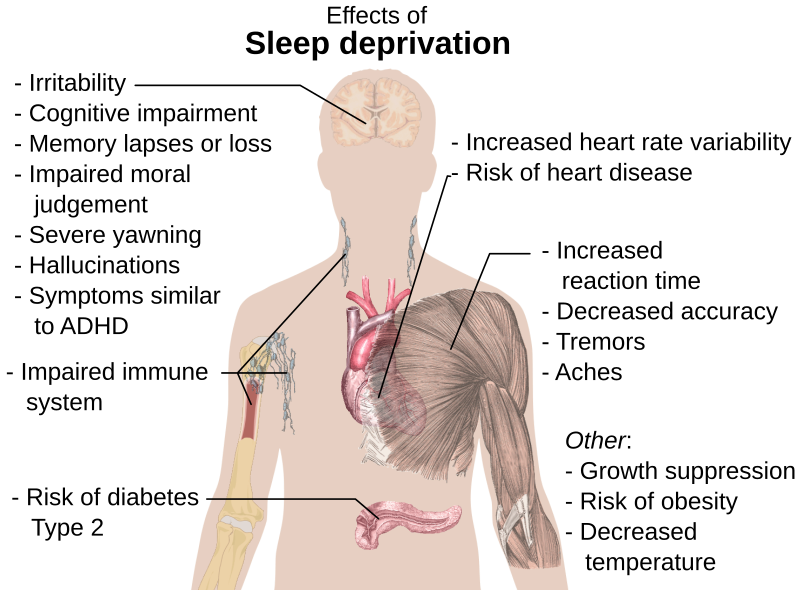Alert: Long Distance Running Can Make Your Brain Shrink, Study Finds
Sleep deprivation is pretty common these days—information technology's a major attribute of achievement-oriented societies—but why would anyone have a love-hate human relationship with it? Unremarkably, one would say,sleep impecuniousness and all the accompanying symptomsare the definition of a beloved-detest relationship, to the core.
Let me tell y'all something: you tin canuse slumber deprivation for your own benefit. Nosotros'll get into how this works, but outset, let'south discuss the phenomenon of sleep, sleep impecuniousness and its symptoms, and finally pattern a "how to" experiment about sleep impecuniousness(commonly known as self-torture), and ask ourselves, more importantly, why?
Sleep: Functionality
"Sleep is a naturally recurring state characterized by reduced or absent-minded consciousness, […] and inactivity of almost all voluntary muscles." (Macmillan, 1981). This is a brusque and clear explanation:
- sleep is characterized by sleep stages/cycles (five cycles, differing in depth)
- the deeper your sleep, the better the quality of sleep
- More Sleep ≠ Better (salubrious avg. 7.v-ix hours)
The functions of sleep are very multifaceted and majorly unexplored, simply these (validated, and usually accepted) aspects interest us the most right now. Sleep has a major touch on:
- on our memory and the ability to re-organize thoughts, experiences and to learn new things (neuroplasticity)
- on the regulation of necessary hormones and the ability of our body to regenerate physically
What is Sleep Deprivation?
Sleep deprivation is the lack of sleep: either information technology was caused by a very superficial and short sleep (over a menstruum of some days) or past no sleep at all. The functionality and benefits of slumber are limited equally a issue (run into above), and we might face up someserious problems, if we stay sleep-deprived for a prolonged period of time.
The effects of sleep deprivation are various; some occur instantly afteracute deprivation, other occur only afterchronic deprivation:

(by Mikael Häggström, Wikimedia Eatables, 2009)
After acute impecuniousness:
- irritability
- cognitive impairment
- memory lapses
- restricted judgement
- severe yawning
- increased centre-rate variability, increased reaction time and decreased accurateness
- temporary emotional instability
After chronic deprivation:
The effects of chronic deprivation boil downwards to the evolution of various diseases, such as:
- Diabetes
- center disease
- growth suppression
- restricted immune system functionality
- weight gain/loss
- depression
Due to the diversity of astute deficits, sleep deprivation has been used as a successful interrogation technique. In fact, the U.S. military authorised sleep deprivation as an interrogation method (Go out no Marks: Enhanced Interrogation Techniques and the Take chances of Criminality, August 2007).
But hey, why would there exist alove-detest relationship here? What'southward the benefit for us?!
How To (..and the benefits of sleep deprivation?!)
The effects of sleep deprivation on the human body were observed and analyzed in the 70s: the methodological monitoring involved blood analysis, but also neuropsychological instruments to capture the brain activity during sleep-impecuniousness and duringrecovery sleep after deprivation.
The results:"There's evidence of antidepressive effect after sleep deprivation."As a thing of fact, subjects experienced a37.2 % improvement in their mood!
The background of these results are diverse—the reasons behind the remarkable mood comeback are, amidst others:
- biochemical investigations proved an increment of different hormones, including serotonin and noradrenaline, which are as well known to functionas a happiness hormone (serotonin) and stimulating hormone (noradrenaline)
- improved sleep continuity and depth in the night after sleep deprivation
These mentioned effects have activity in depressedbut also non-depressed people,meaning that you can stay awake for a night, brainstorm the adjacent day as you commonly do and try to go along yourself awake (that's not very easy!) and get to bed quite early → sleep similar a baby → wake up the next morning withmore power and energy.
By depriving yourself of sleep, youset your biological clock to zilch— in instance your time management is messed up and running out of fuel, this can very helpful (a dear-hate relationship). You lot can phone call sleep impecuniousnessslumberhacking: at commencement we abstain from sleep, and later (during the recovery night) we slip into a very deep state of sleep, which volition regenerate usa.
Absolutely, sleep deprivation amongst healthy people is often met with skepticism, mainly considering healthy subjects can regulate their sleep pattern in other ways (through nutrition, sleep hygiene and sleep rituals). On the other manus, sleep deprivation is free of whatever serious side effects and can serve as a quick gear up. Here's a short how-to:
- Perform your sleep deprivation "experiment" on the weekend (working in a sleep deprived state can be hard)
- Keep yourself awake during your sleep deprivation night (and the following day) with the assistance of tea or coffee, but delight don't overdo it
- Become to bed early on your sleep-deprived solar day, and enjoy your deep recovery dark (7.5 – 9 hours)
- Wake up powerful and energized, feeling like a million dollars
After your sleep deprivation experiment you should take care of a well-balanced nutrition and good sleeping habits—do not backslide to quondam, negative tendencies. Slumber impecuniousness for a night can be applied easily, is highly effective and free of serious side effects. Have you already tried it? Share your experience with the states!
Featured photo credit: Lux Graves via unsplash.com
Source: https://www.lifehack.org/359200/alert-long-distance-running-can-make-your-brain-shrink-study-finds
0 Response to "Alert: Long Distance Running Can Make Your Brain Shrink, Study Finds"
Post a Comment